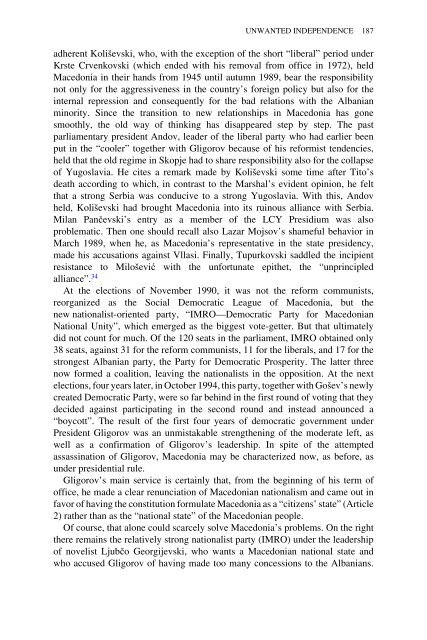Yugoslavia: A History of its Demise - Indymedia
Yugoslavia: A History of its Demise - Indymedia
Yugoslavia: A History of its Demise - Indymedia
Create successful ePaper yourself
Turn your PDF publications into a flip-book with our unique Google optimized e-Paper software.
UNWANTED INDEPENDENCE 187<br />
adherent Koliševski, who, with the exception <strong>of</strong> the short “liberal” period under<br />
Krste Crvenkovski (which ended with his removal from <strong>of</strong>fice in 1972), held<br />
Macedonia in their hands from 1945 until autumn 1989, bear the responsibility<br />
not only for the aggressiveness in the country’s foreign policy but also for the<br />
internal repression and consequently for the bad relations with the Albanian<br />
minority. Since the transition to new relationships in Macedonia has gone<br />
smoothly, the old way <strong>of</strong> thinking has disappeared step by step. The past<br />
parliamentary president Andov, leader <strong>of</strong> the liberal party who had earlier been<br />
put in the “cooler” together with Gligorov because <strong>of</strong> his reformist tendencies,<br />
held that the old regime in Skopje had to share responsibility also for the collapse<br />
<strong>of</strong> <strong>Yugoslavia</strong>. He cites a remark made by Koliševski some time after Tito’s<br />
death according to which, in contrast to the Marshal’s evident opinion, he felt<br />
that a strong Serbia was conducive to a strong <strong>Yugoslavia</strong>. With this, Andov<br />
held, Koliševski had brought Macedonia into <strong>its</strong> ruinous alliance with Serbia.<br />
Milan Pančevski’s entry as a member <strong>of</strong> the LCY Presidium was also<br />
problematic. Then one should recall also Lazar Mojsov’s shameful behavior in<br />
March 1989, when he, as Macedonia’s representative in the state presidency,<br />
made his accusations against Vllasi. Finally, Tupurkovski saddled the incipient<br />
resistance to Milošević with the unfortunate epithet, the “unprincipled<br />
alliance”. 34<br />
At the elections <strong>of</strong> November 1990, it was not the reform communists,<br />
reorganized as the Social Democratic League <strong>of</strong> Macedonia, but the<br />
new nationalist-oriented party, “IMRO—Democratic Party for Macedonian<br />
National Unity”, which emerged as the biggest vote-getter. But that ultimately<br />
did not count for much. Of the 120 seats in the parliament, IMRO obtained only<br />
38 seats, against 31 for the reform communists, 11 for the liberals, and 17 for the<br />
strongest Albanian party, the Party for Democratic Prosperity. The latter three<br />
now formed a coalition, leaving the nationalists in the opposition. At the next<br />
elections, four years later, in October 1994, this party, together with Gošev’s newly<br />
created Democratic Party, were so far behind in the first round <strong>of</strong> voting that they<br />
decided against participating in the second round and instead announced a<br />
“boycott”. The result <strong>of</strong> the first four years <strong>of</strong> democratic government under<br />
President Gligorov was an unmistakable strengthening <strong>of</strong> the moderate left, as<br />
well as a confirmation <strong>of</strong> Gligorov’s leadership. In spite <strong>of</strong> the attempted<br />
assassination <strong>of</strong> Gligorov, Macedonia may be characterized now, as before, as<br />
under presidential rule.<br />
Gligorov’s main service is certainly that, from the beginning <strong>of</strong> his term <strong>of</strong><br />
<strong>of</strong>fice, he made a clear renunciation <strong>of</strong> Macedonian nationalism and came out in<br />
favor <strong>of</strong> having the constitution formulate Macedonia as a “citizens’ state” (Article<br />
2) rather than as the “national state” <strong>of</strong> the Macedonian people.<br />
Of course, that alone could scarcely solve Macedonia’s problems. On the right<br />
there remains the relatively strong nationalist party (IMRO) under the leadership<br />
<strong>of</strong> novelist Ljubčo Georgijevski, who wants a Macedonian national state and<br />
who accused Gligorov <strong>of</strong> having made too many concessions to the Albanians.
















